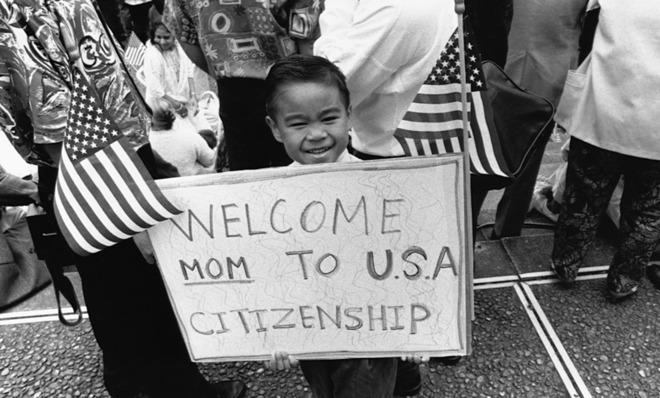How immigration restrictionists should make their case
It certainly isn't by warning America of a "war on whites"


Rep. Mo Brooks (R-Ala.) recently came up with a novel — and hugely problematic — way to describe the country's sometimes rancorous immigration debate. "This is a part of the war on whites that's being launched by the Democratic Party," he told conservative talk show host Laura Ingraham last week.
No shrinking violet herself, Ingraham nevertheless suggested, "That characterization's a little out there." She added politely, "I just think that phraseology might not be the best choice."
Indeed! And not just because it's hard to effectively protest the unfair accusations of racism that Democrats lob at Republicans while Republicans simultaneously decry their opponents as being engaged in a race war.
The Week
Escape your echo chamber. Get the facts behind the news, plus analysis from multiple perspectives.

Sign up for The Week's Free Newsletters
From our morning news briefing to a weekly Good News Newsletter, get the best of The Week delivered directly to your inbox.
From our morning news briefing to a weekly Good News Newsletter, get the best of The Week delivered directly to your inbox.
More importantly, there is a subset of the conservative movement for stronger border enforcement and lower immigration levels that frames the issue as a kind of white identity politics. They point to self-consciously ethnic groups on the other side — did you know "La Raza" means "the race?" — and argue the only viable political strategy is to respond in kind.
That's a misreading of the politics, to put it mildly. Crass racial politics turns off many whites, and employing this rhetoric also obviously limits the coalition for immigration enforcement by repelling many people of color who are harmed by porous borders.
But it also misses the point of a humane immigration restrictionism, which is at its core integrationist and assimilationist. The idea is to craft an immigration policy that reflects the motto on our national seal: E pluribus Unum, "one from many."
Nothing could be more destructive to that project than white people pursuing their own identity politics. A diverse country can tolerate a certain amount of separatism among minority groups. It cannot long endure if its majority group — even a shrinking one — sees itself as distinct from the nation as a whole.
A free daily email with the biggest news stories of the day – and the best features from TheWeek.com
A belief that immigrants should be expected to assimilate sits uneasily alongside a whites-only mentality that offers immigrants nothing to assimilate to.
The inordinate focus on race also obscures a real disconnect between the kind of immigration we are receiving and the kind of economy we are developing. The United States has become a difficult place for lower-skilled workers, such as people without high school diplomas, to get ahead. As such, a large percentage of immigrants are arriving poor and staying poor longer than past newcomers.
Some of this is due to the wage pressure on these workers by mass low-skilled immigration itself. The problem may also be due to the new arrivals entering a high-tech economy increasingly mismatched with their skills.
Either way, the immigration component of America's economic and social problems, ranging from poverty to the number of people without health insurance, cannot be discounted. And while some economists disagree, there is a case to be made that the pressure on the wages and employment opportunities of black and even some Latino Americans is especially acute.
Even Mo Brooks recognizes this. "It doesn't make any difference if you are a white American, a black American, a Hispanic American, an Asian American, or if you're a woman or a man," he said. "Every single demographic group is hurt by falling wages and lost jobs."
What some people call "nativism" is just a recognition that the federal government's primary fiduciary responsibility is to the current lawful residents of the United States. Those residents include people who are not natives at all, people who are white, black, Latino, and Asian.
When America says yes or no at the border, the government must consider the impact on a diverse group of Americans. And the rhetoric of immigration restrictionists ought to reflect this — talk about how a boom of illegal immigrants can hurt legal American citizens of all stripes, not a specific demographic group.
The right brand of immigration restrictionism seeks an America with less focus on race and national origin, not more; a more accessible middle class; and a more harmonious future. The conflicts that can arise from one group of workers struggling to achieve the American dream while being taxed to support Social Security recipients in their retirement are obvious — why worsen those conflicts through immigration policy?
Many supporters of a high-immigration policy have their hearts in the right place. But a 40-year immigration lull during the American Century — admittedly achieved by people whose motives weren't always pure — helped assimilate the country's last great wave of immigrants.
It could be done again if the restrictionist movement withdrew from the war on whites and instead fought for the ideal of one from many.
W. James Antle III is the politics editor of the Washington Examiner, the former editor of The American Conservative, and author of Devouring Freedom: Can Big Government Ever Be Stopped?.
-
 Received a gift card this holiday season? Here’s how to maximize it.
Received a gift card this holiday season? Here’s how to maximize it.The Explainer Make the most of your present
-
 ‘Lumpy skin’ protests intensify across France as farmers fight cull
‘Lumpy skin’ protests intensify across France as farmers fight cullIN THE SPOTLIGHT A bovine outbreak coupled with ongoing governmental frustrations is causing major problems for French civil society
-
 The best books of 2025
The best books of 2025The Week Recommends A deep dive into the site of a mass shooting, a new release from the author of ‘Atonement’ and more
-
 Has Zohran Mamdani shown the Democrats how to win again?
Has Zohran Mamdani shown the Democrats how to win again?Today’s Big Question New York City mayoral election touted as victory for left-wing populists but moderate centrist wins elsewhere present more complex path for Democratic Party
-
 Millions turn out for anti-Trump ‘No Kings’ rallies
Millions turn out for anti-Trump ‘No Kings’ ralliesSpeed Read An estimated 7 million people participated, 2 million more than at the first ‘No Kings’ protest in June
-
 Ghislaine Maxwell: angling for a Trump pardon
Ghislaine Maxwell: angling for a Trump pardonTalking Point Convicted sex trafficker's testimony could shed new light on president's links to Jeffrey Epstein
-
 The last words and final moments of 40 presidents
The last words and final moments of 40 presidentsThe Explainer Some are eloquent quotes worthy of the holders of the highest office in the nation, and others... aren't
-
 The JFK files: the truth at last?
The JFK files: the truth at last?In The Spotlight More than 64,000 previously classified documents relating the 1963 assassination of John F. Kennedy have been released by the Trump administration
-
 'Seriously, not literally': how should the world take Donald Trump?
'Seriously, not literally': how should the world take Donald Trump?Today's big question White House rhetoric and reality look likely to become increasingly blurred
-
 Will Trump's 'madman' strategy pay off?
Will Trump's 'madman' strategy pay off?Today's Big Question Incoming US president likes to seem unpredictable but, this time round, world leaders could be wise to his playbook
-
 Democrats vs. Republicans: who are US billionaires backing?
Democrats vs. Republicans: who are US billionaires backing?The Explainer Younger tech titans join 'boys' club throwing money and support' behind President Trump, while older plutocrats quietly rebuke new administration
